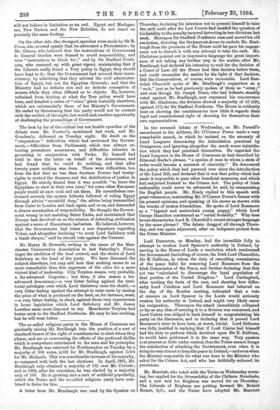Lord Dunraven, on Monday, had the incredible folly to , attempt
to weaken Lord Spencer's authority in Ireland, by moving in the House of Lords a resolution which condemned the Government (including, of course, the Irish Lord Chancellor, Sir E. Sullivan, to whom the duty of cancelling commissions of the peace falls) for removing Lord Rossmore from the Irish Commission of the Peace, and further declaring that this act was "calculated to discourage the loyal population of that portion of the United Kingdom." Lord Carlingford, after reciting the facts of the case, and showing how differ- ently Lord Crichton and Lord Rossmore had behaved on the day of the Rosslea meeting, intimated that a vote of censure on Lord Spencer in the Lords would seriously weaken his authority in Ireland, and might very likely cause his resignation. Thereupon the attack immediately collapsed so far as any idea of carrying it to a division was concerned, and Lord Cairns was obliged to limit himself to congratulating his party on the discussion, and to declaring that it proved Lord Rossmore's error to have been, at worst, trivial. Lord Selborne was fully justified in replying that if Lord Cairns had himself had the duty to perform which devolved upon Sir E. Sullivan, he would have performed it in the same way. Tory passion is at present so little under control, that the Tories cannot forego the satisfaction of attacking the Government, even when it is doing its very utmost to keep the peace in Ireland,—and even when the Minister responsible for what was done is the Minister who asked for the Crimes Act, and who has faithfully enforced its provisions.


































 Previous page
Previous page